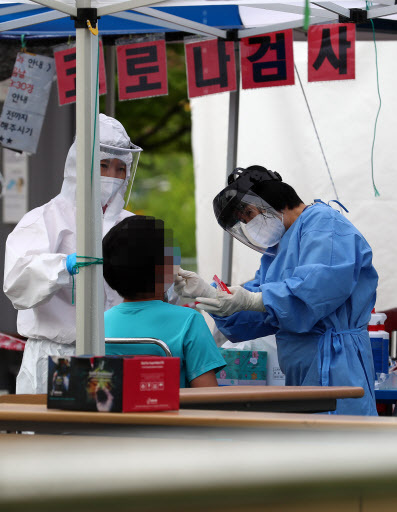Part of COVID-19 antibody test results to be released next week
3,055 Koreans being tested for COVID-19 antibodies
By Ock Hyun-juPublished : June 30, 2020 - 15:48

Korean health authorities said Tuesday they are testing the blood of 3,055 Koreans for antibodies for the novel coronavirus to better understand the degree of immunity in the country, as they gear up for a protracted antivirus fight amid the ongoing second wave of infections.
Some 3,055 Koreans are being tested for antibodies -- 1,555 samples collected from the National Nutrition Survey and 1,500 from a medical institution in Seoul. Antibodies are developed after a person is exposed to COVID-19 to fight it.
In July and August, the blood of 1,000 people living in Daegu and North Gyeongsang Province, two areas hit hardest by the coronavirus outbreak, will be tested for antibodies, according to the Korea Centers for Disease Control and Prevention.
A part of the result will be released by the end of next week, it said.
Through the antibody tests which are to be completed around the end of this year, authorities hope to find out what portion of the Korean population has been exposed to COVID-19 and how many of those people got the virus without displaying any symptoms at all.
This comes as Korea grapples with an increasing number of both local and imported infections.
The country added 43 more cases -- 23 cases locally transmitted and the rest coming from overseas -- Tuesday, with cases traced to small religious gatherings expanding to other parts of the country beyond the Greater Seoul area that includes Incheon and Gyeonggi Province, according to the KCDC.
Of the locally transmitted cases, 13 cases were reported in the densely populated Seoul and the surrounding area. Five cases were reported in Daejeon and three in Gwangju, along with one each in Gangwon Province and North Chungcheong Province, according to the KCDC.
Health authorities are on their toes over the coronavirus spreading beyond the Greater Seoul area through small religious gatherings, warning they would put in place “forcible measures” to stem the spread of the virus.
Cases traced to a major church in Seoul’s southwestern district reached 31 as of noon Tuesday, up three from the previous day. A total of 23 cases were confirmed in connection with a church in Anyang, Gyeonggi Province, up one from a day earlier.
Two more cases linked to a Buddhist temple in Gwangju were reported, bringing that total to 14.
The increase in cases coming from overseas also poses a threat to authorities’ efforts to contain the virus, with 34.7 percent of new cases in the past two weeks having been imported.
Korea reported 20 additional imported cases, raising the total of such cases to 1,582. Of the newly reported cases, three came from the US, one from Europe, two from Africa and 14 from Asia, including 10 from Kazakhstan.
Of imported cases reported Tuesday, 13 were detected at the airport quarantine screening and the rest while under quarantine after they entered the country from abroad.
Imported cases fell to a single-digit figure early this month after the country made two weeks of self-quarantine mandatory for all international arrivals on April 1. But such cases have bounced back into the double digits since mid-June.
“It is clear cases coming from overseas are increasing because the COVID-19 outbreaks are expanding worldwide in more countries and continents,” said Kwon Jun-wook, the KCDC’s deputy director, at the briefing Tuesday.
The KCDC earlier said a second wave is already underway, albeit on a smaller scale, in the Seoul metropolitan area that includes Incheon and Gyeonggi Province, home to half the country’s population.
The country has seen small-scale, sporadic outbreaks, mostly in the Seoul area, since it relaxed strict social distancing on May 6 on the back of a slowdown in the infection rate.
Out of the country’s total 12,800 cases, 11,537 people, or 90 percent, were released from quarantine after making full recoveries. Currently, 981 remain under self-quarantine.
The death toll remains unchanged at 282, with the overall fatality rate at 2.2 percent. The fatality rate of those in their 80s or over is much higher, at 33.3 percent.
The country has carried out 1,273,766 tests for the coronavirus since Jan. 3.
By Ock Hyun-ju (laeticia.ock@heraldcorp.com)
-
Articles by Ock Hyun-ju

















![[KH Explains] Hyundai's full hybrid edge to pay off amid slow transition to pure EVs](http://res.heraldm.com/phpwas/restmb_idxmake.php?idx=652&simg=/content/image/2024/04/18/20240418050645_0.jpg&u=20240418181020)

![[Today’s K-pop] Zico drops snippet of collaboration with Jennie](http://res.heraldm.com/phpwas/restmb_idxmake.php?idx=642&simg=/content/image/2024/04/18/20240418050702_0.jpg&u=)